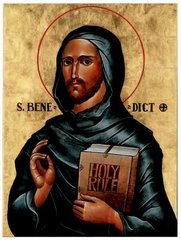In three days after Lent, the Holy Church celebrates the greatest mystery of salvation - the Paschal Mystery: Christ's passion, death and resurrection, the event that brought us salvation from sin and death, made us able to be reconciled with the Father and gave birth to the Church from Christ's side. This is the heart of our faith, the mystery that gives meaning to our faith and our identity as one Church. What we celebrate on these days are so important that these are the most solemn and greatest days of the Faith. These three days are the heart of our liturgical year. Through our celebration, rituals and words, we experience and make present the saving acts of the Lord. We become one with Christ, our Head, in his offering of himself and his resurrection for our sake. When we remember and make him present in the liturgy, we experience his salvation - as Jesus passed on the Spirit to the Church when he died, we who remember and make present in the liturgy this event also receive his Spirit.
Then and Now
In the history of Christian worship, the original feastday is Sunday - the day of creation and the resurrection. In the first centuries of her existence, the Church celebrated the Paschal Mystery every Sunday and then eventually, the yearly commemoration of the events which is what we have now as the Triduum. Much of what we do in the liturgy of the Triduum we get from Rome and Jerusalem of long ago, which is why we should respect and maintain what we have received. But then, just like many other things, we forgot this celebration and replaced it with things of lesser value. We should value what is important, and this Triduum is important. Vatican II reforms restored this celebration and gave Christians of our generation a beautiful and meaningful celebration.
Proper Value
This should be the most important celebration for all Christians. But often, it gets neglected and buried under devotions to saints, or even to Christmas, even if it is the celebration of what's important, our salvation. It is a must that this celebration is planned, enriched and celebrated by the whole community, with sufficient ministers, music and dignified signs because our experience of what we celebrate depends on the proper and beautiful execution of the rites.
Liturgy and Devotions
The Triduum starts with the Evening Celebration of the Lord's Supper and ends with Evening Prayer II of Easter Sunday. We celebrate it through liturgy - the Evening Celebration of the Lord's Supper, the Celebration of the Lord's Passion and the Easter Vigil. We also have the Liturgy of the Hours, which we should solemnly celebrate on Good Friday and Holy Saturday morning. Aside from liturgical celebrations, we also have popular devotions - processions, Way of the Cross, Pabasa, Senakulo, among other things.
3 days for 1 Celebration
The liturgy of the Triduum make up only one celebration. It begins with the Entrance of Holy Thursday night and ends with the dismissal of the Easter Vigil. There is no signing of the cross at the start of Good Friday and Holy Saturday celebrations. People should know that they will come back for the continuation. The intrinsic unity of these parts should be manifested - these three are one because the Passion and Death we commemorate on Good Friday and the Resurrection we commemorate in the Easter Vigil make up one event, an event that the Eucharist which we celebrate on Holy Thursday perpetuates. The Paschal Mystery is one mystery - the Passion, Death and Resurrection is one event.
Preparation makes a Good Celebration
It is a challenge for all of us to make Easter Triduum meaningful and beautiful. For this purpose, we should catechize the faithful so that they may know what they will participate in and how they can participate fruitfully. In planning, we should also remember that the liturgy is more important than devotions and we should be faithful to what is set in the liturgical books. We can make our celebration more meaningful if we do not cut parts for convenience or worse, lazines. Liturgy, we should remember, is not a show or a spectacle and the people of God are not spectators but participants. When the celebration is properly planned and prepared for, celebrated with sufficient ministers, music and solemnity with the Mystical Body of Christ participating, we can truly glorify God and sanctify humanity.
Jeffrey Velasco
Hango mula sa Paschales Solemnitatis, Missale Romanum, A Theology of the Holy Week and Easter Triduum ni Anscar Chupungco OSB, Tatlong Araw na Pagdiriwang ng Pagpapakasakit at Muling Pagkabuhay ng Panginoon ni Msgr. Andres Valera
Iscriviti a:
Commenti sul post (Atom)

Nessun commento:
Posta un commento